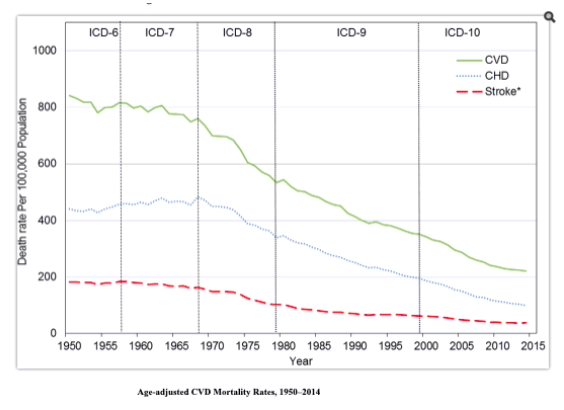Altered Reality — Are Declining Cardiac Death Rates Attributable to Drugs

Sometimes I feel as if I live in an alternative reality. This seems particularly true when I see ads promoting drugs for hypertension or high cholesterol. What do these drugs have in common? They promise to keep Americans alive by reducing deaths due to cardiovascular disease.
Manufacturers of blood pressure medications and cholesterol-lowering drugs suggest that their drugs increase survival. However, there is more to this story than meets the eye.
Pharmaceutical advertising copywriters and medical communication writers live in a sort of Twilight Zone where they are responsible for educating the public about prescription drug treatments and heart disease. An ad writer for an angiotensin converting enzyme (ACE) inhibitor for hypertension uses evidence and data to convince consumers and clinicians that ACEs protect people from heart disease, kidney failure, and death. However, if their client of the week sells angiotensin receptor blockers (ARBs), the same writer gets paid to say that an ARB increases a patient’s chance of survival more than an ACE inhibitor. To emphasize the point, the ARB manufacturer directs the ad writer to emphasize the “high incidence” of cough reported in patients taking ACE inhibitors. Then the manufacturer of ACEs tells the writer to say that cough rarely occurs. You can see why life as a pharmaceutical ad writer carries a certain element of fantasy.
If everyone believed that exercise and diet were more effective than prescription medications at prolonging life, medical advertising writers might quickly be out of a job. Instead, the drug marketing industry uses inference and speculation to persuade physicians, policymakers, and consumers that death and disease are most easily avoidable if one takes the right pill. The academic community is more balanced when delivering information. Their stance is that the decline in cardiac death rates is in part due to reductions in nonpharmacologic risk factors.
A Canadian study (2009) reporting a 30% decline in the death rate from cardiovascular disease from 1994 to 2004 attributed the decline to lower smoking rates as well as to the use of medications. A NEJM article (2007) attributed the drop in mortality due to heart disease among US adults (1980–2000) to risk factor and lifestyle modifications as well as evidence-based medical therapies. But what many fail to understand is that death rates from cardiac disease have been on the decline since the 1960s, as shown in this 2017 study.

According to an article in Annual Reviews (2011) the declines in CHD mortality rate precede modern medical treatments and are primarily due to reductions in risk factors such as smoking, total cholesterol, and blood pressure. Many experts say reductions in total cholesterol are associated with dietary changes recommended in 1964 by the American Heart Association. Ironically, declines in cardiac death rates have deaccelerated in recent years despite improvements in blood pressure, cholesterol, and smoking from 1999 to 2012. This change is attributed to overall increases in body mass index and Type 2 diabetes. But healthy eating and physical exercise do not generate profits for drug companies.
I am not advocating for people to rise up and throw away their blood pressure and cholesterol-lowering medications. I only advocate for a healthcare information system in which information flows freely, giving all sides of the story, and in which we are not so quick to assume that there’s a pill for every ill. The oversimplification of medical communications has serious consequences. While prescription medications can be life saving, there are times when they are not the panacea they appear to be.


One Comment
hey lydia
its alwayz sumthng new on ur platform but u really seems to be a little prone to dislike pharmaceutical industry..havnt read all ur blogs …but isnt it tht we hav less infant deaths, now we dont c ppl dying of simple infections, etc
btw…i m a pharmacy student (conflict of interest as u may say ..hahah)